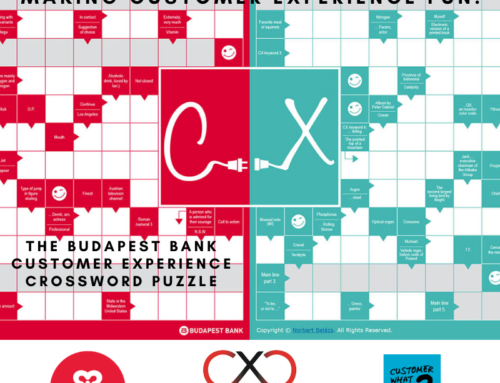
A few months ago we kicked off some research based on the 6 key customer experience elements referred to as the 6 Ps principles. These were discussed in a recent article posted on MyCustomer.com. The 6 Ps qualitative research sets out to determine the extent of the influence on the success, or otherwise of Customer Experience on business and to discuss the challenges and impact customer experience practitioners are having within their business and industry.
From the initial discussions conducted with some of the Customer Experience practitioners across a range of industries including, finance, insurance, retail and utilities. The most contentious item so far has been where the CX lead and their team sit within the organisation and how long they stay. With the level of access, support and sponsorship they have received from the board tending to be a key success lever more than any specific host organisation.
That customer needs and desires are changing isn’t new, however their needs and desires are not only changing but broadening as well. A recent study by GfK says states “Baby Boomers still lag in mobile behaviours; but the two Millennial generations also diverge often” …. New generations of buyers are coming on to the market demanding new ways of making purchases whilst existing buyers still represent a large part of the market and must continue to be accommodated.
Why is this important in determining where the CX team should be within any organisation? Well taking this part of the customers’ journey alone could indicate that marketing is the best place to land the CX team and many businesses have come to that conclusion.
However there is much more to customer experience and their journey, with marketing being just part of that journey. Customers won’t be manipulated and can spot the usual tricks much sooner and much more often. It has also become clear that many marketing teams are behind the curve with regards to customer experience wanting to focus on the next big thing instead of all the big things.
Many other disciplines also spot the opportunity and set up CX type capabilities, including IT, Sales, Service, HR, to name but a few. Are they also right?
Some early findings from the research have identified that all of these and others host CX capabilities with most coming from the individuals successfully proposing the opportunity and having varying levels of success. This success however comes from one source, this being direct board sponsorship, without this no CX initiative, wherever hosted will be either sustained or successful.
A few hints from the research on how to grab the board’s attention include.
- Proven examples and stories that support competitive advantage of Customer Experience
- Robust indicators leading to specific insights including customer and employee retention (Csat, NPS, ENPS, etc.). These will uncover trends allowing better planning and event prediction.
- Identify strong ROI of customer experience improvement initiatives.
- Industry trends and analysis to demonstrate competition opportunities and threats
The general consensus so far seems to be that the organisation hosting the customer experience capability is the one who made the suggestion, closely followed by, whoever wants to fund it. Clearly not a great way to guarantee sustained success of any venture let alone one with such far reaching implications for the continued competitiveness of the business.
From the interviews it has been clear that the most successful in terms of making progressive change to improve customer experience are those with best sustained access and influence with the board. Further, the customer experience strategy must also be aligned with the corporate strategy, obvious, yes, in practice, not always.
So far we have realised that the “Position” the Customer Experience team has within the organisation is important but what’s more important is access and credibility to and with the board to have the support to make the changes. With one of the key ingredients for the board being to possess the passion to make the changes and to do better for the customer. An article from McKinsey& Company states “ ..Senior executives will want to set a clear, inspiring vision for the ideal customer experience, including a change story to underline the importance of delivering on goals.” It’s clear that without board support this can’t happen. In a further article they go on to say “What do my customers want? The savviest executives are asking this question more frequently than ever, and rightly so. Leading companies understand that they are in the customer-experience business, and they understand that how an organization delivers for customers is beginning to be as important as what it delivers.” ….
Conclusions
Due to the holistic nature of the customer experience capability and the spread of implication of changes required to make improving customer experience successful. Having the support, sponsorship and regular access to the board as well as the right levels of investment holds the key to success. The role of the board is to provide and demonstrate leadership, provide overall governance and be accessible for the customer experience team to be successful. The role of the Customer Experience team is to provide the board with the education, knowledge and insights that will enable them to make the right decisions regarding the customers. The relation should by symbiotic, without this, no matter where the customer experience team sits, the initiative will fail.

John Morris is an MBA graduate from the Open University, an ex RAF technician and 33 year veteran from Intel Corporation where he managed business interests in a variety of countries including Russia, US and Poland as well as the UK.
He is a passionate advocate for delivering exceptional customer experience with a proven record of driving CRM solutions, business improvement and change through a combination of people and team development, strong operational thinking and innovative business management. During his career, he has created and led Technical, IT and Operational teams across Europe and US.
John has been involved in and led numerous projects involved in Quality management, Customer Support, Technical Sales, CRM / PRM, Sales Operations and Customer Experience. These have been developed within the context of Technical, Operational and IT businesses both within the UK and abroad including Russia, Poland and US.
Chronologically, John began his career with the Royal Air Force as an aircraft technician transitioned into industry in 1981 joining Intel Corp. Moving through a variety of customer touch and back office disciplines including Technical Support, Market Development and Product Quality before moving into management and leadership positions covering Technical and Operational teams and directing IT for Intel in EMEA.
He is now leveraging the knowledge gained from his variety of experiences to provide transformation support for businesses and co-authoring a book on the delivery and implementation of Customer Experience.
Email: john.morris@jxdconsultants.com
Mobile 07587147759






Hi John, one place for the CX team to sit is under a Chief Customer Officer – a senior role that is well-established in the US, and is now being adopted in the UK too. This provides CX leadership, without it being part of a particular, existing department which may only have a partial view of the customer journey. There’s more on what the role involves in this post http://www.eptica.com/blog/do-you-need-chief-customer-officer-0